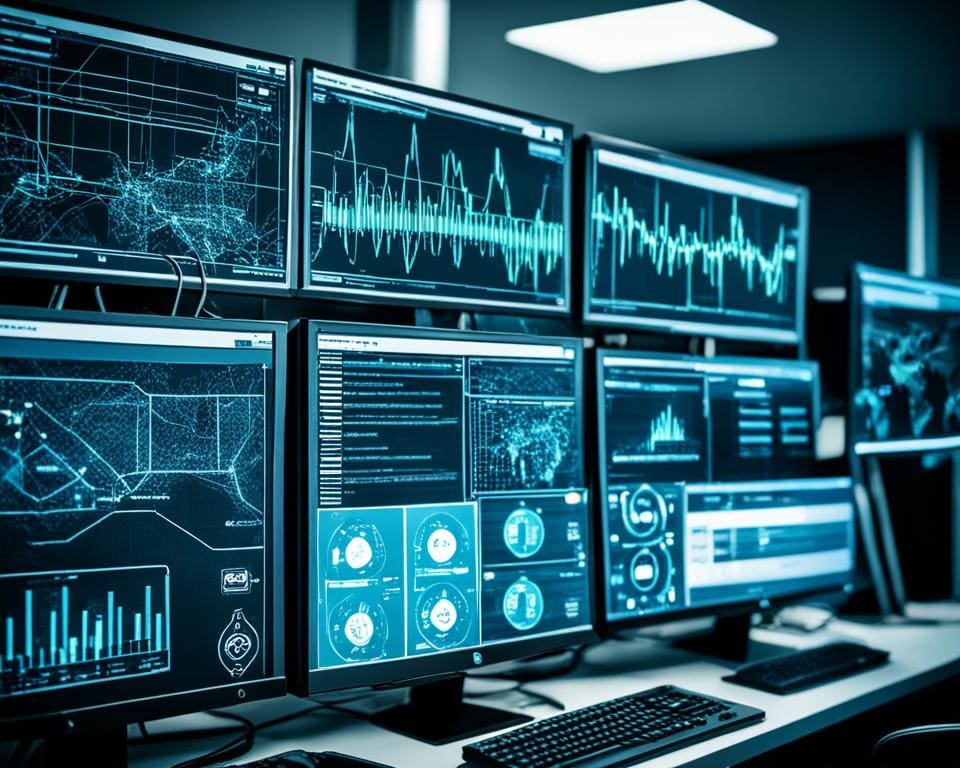In the digital world of today, keeping an eye on the network is key. It helps protect businesses by watching over important parts like routers and servers. With more businesses going online, strong IT security is more important than ever. If the network security fails, it could lead to lost data and big money losses. A single hour of IT problems can cost big companies over $300,000. This shows how vital network monitoring is in avoiding such expensive problems.
By keeping a close watch, businesses can avoid a lot of network issues. It’s good to check if devices are working every minute. And looking into their CPU and memory every five minutes helps too. Good network monitoring software makes it easier for businesses to spot and handle risks fast. As businesses grow, these tools can grow with them, keeping systems running smoothly. With the right cybersecurity steps, businesses can keep their operations going without interruption. Good network monitoring means stronger security and more trust from everyone involved. It’s key for dealing with the tech challenges of today.
Understanding Network Monitoring and Its Importance
Network monitoring is essential for keeping businesses running smoothly and safely. It keeps an eye on network health and performance 24/7. This helps organizations spot problems early and act quickly. By monitoring their networks well, companies can protect their data and keep their operations strong.
What is Network Monitoring?
Network monitoring uses special software to watch over network activities and fix problems before they grow. By focusing on key performance metrics, businesses can spot areas that need improvement. For example, checking the network every minute helps catch and fix slowdowns early.
There are different tools for monitoring, like SNMP, CLI, WMI, SSH, and NetFlow. Each serves different needs and helps firms secure their networks and run smoothly. Using these tools correctly is vital for keeping networks safe and efficient.
Key Components of Effective Network Monitoring
For top performance, focus on these important parts of network monitoring:
- Discovery: Finding all devices in the network for complete oversight.
- Mapping: Showing network connections to understand traffic flows.
- Monitoring: Always checking key signs like CPU usage and speed.
- Reporting: Making reports to follow performance and see trends.
- Alerting: Setting up warnings to quickly deal with threats.
Combining these elements helps businesses boost their network security and stay resilient against disruptions. Also, being proactive in monitoring means fixing issues faster (MTTR) and giving users a better experience.

Why Network Monitoring is Critical for Business Security
Effective network monitoring is key for solid business security. It’s more than just watching; it’s about having tools for quick threat detection. This way, companies can react swiftly to security issues. With cyber threats always changing, staying alert is crucial for today’s businesses.
Real-Time Threat Detection and Response
IoT devices are growing rapidly, with numbers expected to hit 29 billion by 2027. This makes watching for threats more important than ever. Network monitoring gives insights that help spot unusual activities, hinting possible security risks. Schools like Decatur City use network monitoring to keep track of devices and boost their cyber defense.
Minimizing Downtime and Financial Loss
Downtime hits companies hard in their wallets, possibly freezing operations. It’s said that IT downtime can cost over $300,000 an hour. Firms like Audatex must monitor networks well to avoid such costly hiccups. Strong network monitoring means businesses run smoothly, dodging big money losses from downtime or data theft.
Enhanced Compliance and Reporting Capabilities
In the modern, fast-paced world, keeping up with rules is key for handling private info well. This is true for many areas like healthcare and finance. They have to follow strict rules like the Federal Information Security Management Act and PCI-DSS. Strong network watching tools are essential for keeping an eye on network actions. This helps protect client info and stops data leaks.
Meeting Regulatory Requirements
Staying on top of compliance is a must. It lowers the risk of legal and financial problems from not following rules. Organizations with solid IT security avoid big fines and damage to their reputation from data leaks. Network monitoring tools help businesses automatically keep track of compliance. This makes them more alert and ahead in their field.
In-depth Performance Reporting
Good reporting is more than just about following rules. It gives organizations critical info on how their networks are doing. This info helps in making smart choices about updating equipment and using resources better. Using cloud or open-source monitoring tools brings two big pluses. These include better insight into performance and saving money. Being proactive in monitoring cuts down on downtime and boosts productivity. This shows the organization’s commitment to high standards and honest operations.









